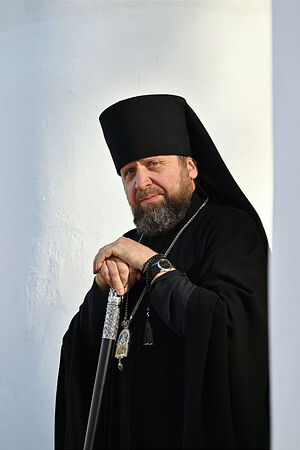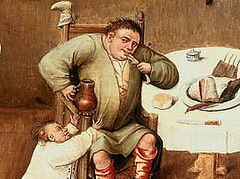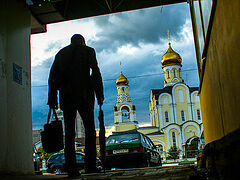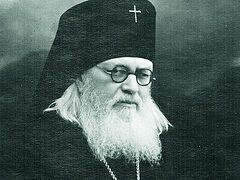How can modern Christians, children of a humanistic society in which humanity is the measure of all things, develop the skill of self-restraint? What is ascetic life for laypeople, especially for neophytes? Bishop Porfiry (Prednyuk) of Lida and Smorgon (the Grodno region, Belarus), a Master of Theology, a lecturer at the Minsk Theological Academy, answers these and other questions.
—Sometimes the words “ascetic life” are associated with great heights and spiritual feats even for church-goers. What would you advise an ordinary Christian (or, more precisely, someone who has just embarked on the path of spiritual life) to start with?
—Sometimes the words “ascetic life” presuppose something unattainably sublime. But I recall the words of His Holiness Patriarch Kirill that it is not at all about living in a cave and fasting continuously, but about being able to control your instincts.
The Church is ascetic by nature, and certain rules of worship, a culture of behavior and communication have developed in it. However, a person, regardless of how long he has been in the Church, must understand that our nature is essentially the same: the fight against sin that is inside us is the main task of our lives. A layman differs from a monastic only in his way of life, but the Gospel is the same for everyone. And the words, From the days of John the Baptist until now the Kingdom of Heaven suffereth violence, and the violent take it by force (Mt. 11:12), apply to everyone without exception and remind us that for everybody spiritual life is a titanic labor. One of the most important ascetic tasks for modern Christians is to try not to judge others.
—A difficult feat...
—The spirit of judging is especially widespread today in every group of people, every parish, and every family. Another very important ascetic skill is to be sensitive to others. For instance, how difficult it can be to listen to your non-religious relative with a non-Christian worldview, not to dismiss him and pass him by!
It was said to mankind in the person of Adam: In the sweat of thy face shalt thou eat bread (Gen. 3:19). Any work that we do every day, both at home and at work, is a kind of ascetic labor, because it requires efforts, knowledge and creativity. If you love your job sincerely, trying to do it to the best of your ability, this is your daily feat, which will bring good fruits. Since our nature was corrupted by sin, we need to make painstaking efforts to do any good, and we should keep this in mind in moments of weakness and indifference.
 Bishop Porfiry of Lida and Smorgon —Now let’s talk about spiritual literature. How should we choose it properly? For example, such Patristic works as the Philokalia were written by monks and, in general, for a monastic audience. Which literature should laypeople start with when taking the first steps?
Bishop Porfiry of Lida and Smorgon —Now let’s talk about spiritual literature. How should we choose it properly? For example, such Patristic works as the Philokalia were written by monks and, in general, for a monastic audience. Which literature should laypeople start with when taking the first steps?
—Indeed, it is important to find the literature that will be useful. For instance, a doctor reads medical literature, an engineer reads manuals relevant to his profession. The same applies to spiritual literature: some books will be useful for monastics, others, for laypeople. It is not a question of this or that literature being better or worse, but that it should be chosen with the help of a spiritual mentor, in accordance with the way of life of a particular Christian.
—Yes... If a neophyte starts reading the Philokalia, he simply won’t understand anything.
—There is good literature for neophytes. For example, selected letters of the Venerable Elders of Optina—Leo (Leonid), Anatoly, Macarius and Ambrose. In addition, there are separate selected letters of St. Ambrose of Optina to his spiritual children. At that time father-confessors and spiritual elders often corresponded with laypeople. I would also recommend selected letters of Igumen Nikon (Vorobiev), who lived in the twentieth century, and letters of St. Paisios the Hagiorite on the virtues, passions, modern youth and family life. The Venerable Paisios wrote in rather lively and modern language, which is very clear and close to modern people. It is also important to be able to express your spiritual experience... After all, not everyone, even with great spiritual experience, knows how to express it in words.
—Is it possible to be successful in the worldly sense and at the same time keep yourself from modern temptations?
—I personally know many church-going, decent, but at the same time (as they say today) successful people. These are very pious, God-loving people who really strive to live with Christ in modern reality.
We cannot deny that the modern world is literally saturated in sin. Sin has become the norm. But nothing is impossible for the grace of God. And if you long for God, then there can be no insurmountable obstacles on your path. I like the saying of St. Paisios the Hagiorite, who all his life strove “not to upset the Lord.” If we set ourselves such a task, if we always ask ourselves whether our actions and thoughts are pleasing to God or not, the Lord will strengthen us.
—But sometimes people, especially at the beginning of their spiritual path, think that giving up their “favorite” sins will make their lives boring…
—We must understand that when we say, life according to the Gospel, we don’t mean refusing all earthly comforts, but rather excess and overindulgence. The Church blesses us to have a family, but teaches that adultery is a grave sin. We are allowed to eat delicious food, but we should try not to overeat. It’s the same in everything else. In fact, passion is suffering, an illness. When everything in our lives is moderate, it is good for us; and lack of moderation is destructive in all respects.
The Venerable Silouan of Mt. Athos said that at first sin brings us an illusory pleasure, but it is inevitably followed by suffering and emptiness. Sometimes you don’t even understand where these states come from. But all these are links in a chain: once I have sinned, it inevitably weighs so heavy on my soul. We must understand that our sins are our illnesses. The Lord does not demand that we part with something we really need. We must part with the illnesses of our souls, which are parasites infecting our natural needs, distorting them, because initially everything in man was good. And if we strive to correspond to the Divine plan for us, we will have what in modern language is called happiness and fullness of being. After all, happiness is not outside, but inside us, in our pure hearts.
—But if after coming to God a person doesn’t find happiness, but finds disagreement with his loved ones? Sometimes it happens that children and parents can’t find a common language, and marriages start deteriorating…
—There is a saying that is not without humor: “When a neophyte appears in a family, the other family members become martyrs.” We must prevent such a situation. The Holy Fathers teach us that prudence is the mother of all virtues.
Indeed, it often happens that after converting to God due to lack of experience a person can cause misunderstanding among his loved ones by his actions. For example, a woman approached a priest and asked him to bless her to read works by St. Isaac the Syrian. The priest wondered, “Where is your husband?” She replied, “He’s at home, watching TV.” The priest advised her first to start paying due attention to her spouse, and then to read St. Isaac the Syrian. And perhaps due attention will help her husband get closer to God.
It is very important for Christians to try to give attention to their nearest and dearest, showing them love; and this personal example will be the best sermon of Christianity.
—It happens that Christians are overly concerned with their external piety, while remaining inattentive to what is happening inside them, to the movements of their own souls…
—Yes, a person may get hung up on the externals, on superficial things. And if he does not commit grave sins (say, he does not steal, does not fall into carnal sins), then he thinks that the goal has been achieved. But spiritual life is constant inner work. As one poet [Friedrich von Logau.—Trans.] said: “The struggle with yourself is the most difficult one, The victory of victories is a victory over yourself.” That is, to win a victory over yourself is the greatest achievement. The Church calls such winners saints. We are all called to holiness. True spiritual life is continuous attention to what is happening in our hearts. For example, if I am reprimanded, how do I react to it? How do I respond to someone asking for help? Do I know how to be compassionate and supportive?
—One more question: How can we find a spiritual mentor? After all, a layperson’s relations with his father-confessor are not the same as those of a monastic with his spiritual father.
—Most often a layperson’s father-confessor is a priest to whom he regularly comes to confession. And a spiritual father is the one who knows your life more fully—it is a more thorough spiritual guidance. However, many confuse obedience to a father-confessor in the monastery with spiritual guidance in the world.
A father-confessor just gives advice to laypeople, and the final choice is up to the person himself. In the world there is no unconditional obedience to a spiritual father, which is practiced in monasteries.
How should you choose a father-confessor? Listen to your heart and observe whether a priest lives according to the Gospel or not. It is very important and valuable for everyone to have in their life someone who is more spiritually experienced, who has already walked the path that you are walking now, with whom you can share your experiences, from whom you can get wise advice, to whom you can pour out your soul and calm down. If we ask God for this, the Lord will definitely send such a spiritual mentor into our lives.




